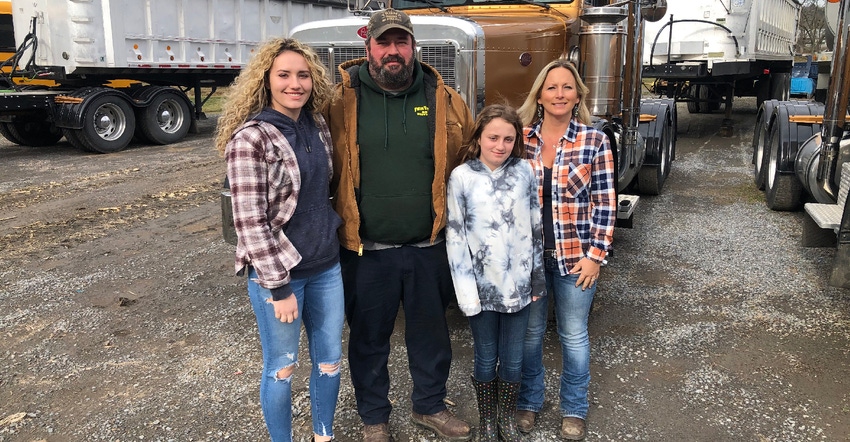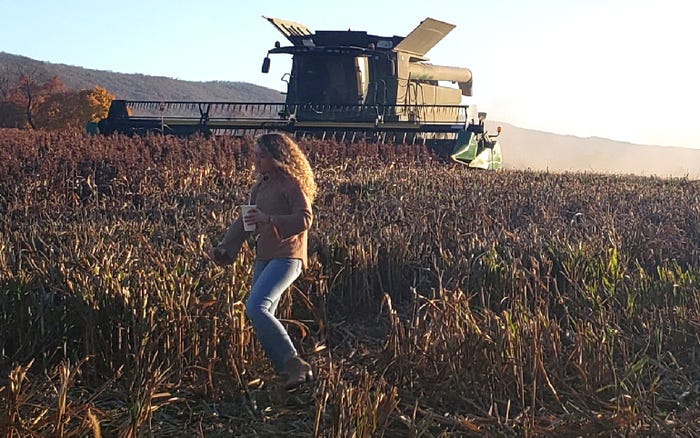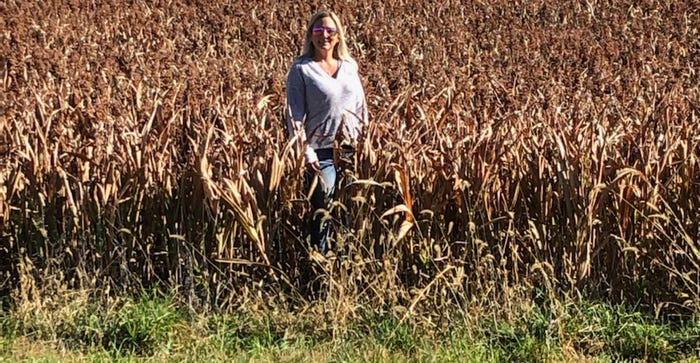
When you think of sorghum, you tend to think of places that get hot — real hot — during summer. Think of Texas, Oklahoma and Kansas.
According to Purdue Cooperative Extension, the average temperatures need to be at least 80 degrees F in July in order to get maximum sorghum yields, and at least 90 degrees for maximum photosynthesis.
So how in the world did Harry and Winter Johnston of McConnellsburg, Pa., grow 245.8 bushels of sorghum an acre when the average yield in Kansas, the largest sorghum-producing state in the country, was 85 bushels an acre in 2020?
Well, it was a contest plot, so those plants got some extra attention anyway. But 150 to 175 bushels for their average plot isn’t too bad in the shale hills of Fulton County.
"The last 10 years we've been doing some extra stuff," Harry says. "And of course, you know, fertility. Just make sure everything is there, and that it's not lacking."
The Johnstons set the record for dryland, no-till in the 2020 National Sorghum Producers Yield Contest. This wasn’t the first time they’ve placed nationally. In fact, Harry and Winter have placed so often that they’re technically no longer allowed to enter, so their 15-year-old daughter Ella “grew” the crop.
For their 2020 contest plot, they planted Pioneer 84G62, one of Pioneer’s top sorghum hybrids, using a Sunflower no-till grain drill. Sorghum is a lot like corn, Harry says, in that nitrogen is important to get the crop going.
He went extra on the N in the contest plot and worked with Canadian company CanGrow on some foliar micronutrient applications to get some tillering going. He also sprayed for insects with a big focus on aphids. But Mother Nature gave them some help, too.
“We had a ton of rain,” Winter says. Every week they got an inch of rain over summer, she says, and when it came time to harvest, the rains stopped, making for a timely harvest using their John Deere S660 combine.

Ella, 15, helped with the sorghum harvest this past fall. She ran the grain cart and did other work to help get the crops harvested.
Sorghum is a unique crop in that it not only thrives when it’s hot — its drought tolerance is well-known —but it also can thrive when it’s wet. The test weight was good and moisture level at harvest, at 15.5%, was spot on.
“It was the perfect year for sorghum,” Harry says. “Every little thing came together, and it worked pretty good.”
Jeff Sherman, a representative for CanGrow Crop Solutions, worked with the Johnstons on three treatments to get the crop going this past year. It started around planting, he says, with a product to stimulate mycorrhiza in the soil and get the seeds growing. He then applied a foliar around the V4 to V6 stage, and then a third treatment later in the season to draw potassium into the plants.
“So it’s watching the hormone flow of the plant and trying to get it to tiller at the right time, shut down and then into grain fill,” Sherman says. “We’ve been able to accomplish that with two or three sprays, and that’s it.”
Sherman, who’s based in Lancaster County, says sorghum is a good compaction relief crop because of its deep roots, and it adapts well to any environment except cold weather. Yields need to be 170 bushels or more to compete with corn, but inputs, he says, can be had for $30 an acre, and the seed is generally cheaper than corn.
Cheaper alternative
The Johnstons farm close to 3,000 acres — 350 owned and the rest leased ground, and custom farming acres they do for other farmers.
They run a 100-head cow-calf operation, so much of their acreage is in hay. They also grow hundreds of acres of corn, soybeans and wheat in various rotations.
Harry says he got interested in sorghum after talking to a farmer in Lancaster County who was growing it. At the time, sorghum was fetching $3 a bushel more per acre than corn, so it seemed like an attractive alternative. He also wanted to diversify his acreage into something other than traditional field crops.
“I usually follow it after wheat or soybeans," he says. "I find that it’s pretty hearty. You can grow on the shale ground, and deer don't eat much of it."

Winter Johnston was inducted into the Sorghum Producers Yield Contest Hall of Fame in 2019. She and her husband, Harry, have become well-known for producing good sorghum yields, and this year the farm broke a sorghum contest record, yielding 245.8 bushels in the dryland, no-till category.
The Johnstons grow between 100 and 200 acres of sorghum a year. It gets sold to a buyer in nearby Chambersburg, Pa., who stores, cleans and dries it. It’s then shipped to a bird seed manufacturer in Hamburg, Pa. Having a buyer so close is key, Harry says, because many local elevators don’t deal with sorghum and aren’t interested in buying the crop.
“It’s very similar to corn in terms of fertilizer and herbicides, but seed cost is a tenth of what corn is. You can skip some herbicides if you need to,” he says. “Economically, it’s better than corn, and the facility we take it to is only 25 miles away, so it’s not like we have to haul it from here to Harrisburg or New Jersey to the docks.”
Testing themselves
The Johnstons don’t grow a whole lot of sorghum. They don’t have to produce a lot to pay for their land since land prices, Harry says, are much cheaper where he farms.
But there’s benefits to entering the contest. In a “normal” year, they’d likely be on their way to Commodity Classic in Texas with their daughters, so they’d get to spend time with each other.
They’ve also gotten to know other sorghum growers around the country, and Winter was inducted into the Sorghum Growers Yield Contest Hall of Fame in 2019.
Contests are useful because a grower can incorporate many things from the contest plot into their regular plots. But Harry says that he’s careful not to incorporate too much. For one thing, applying copious amounts of fertilizer, micronutrients and other things must pay, and it creates more risk if Mother Nature doesn’t cooperate.
So, what does he get out of competing? “Just to see what I can do. Test yourself each year, I guess.”
Other regional winners in the Sorghum Producers Yield Contest:
Dryland no-till
Second place: Chris Santini, New Jersey, 204.64 bushels, Pioneer 84G62
Third place: River Hollow Farms LLC, New Jersey, 197.99 bushels, Pioneer 84G62
Dryland tillage, east
First place: Santino Santini Jr., New Jersey, 203.94 bushels, Pioneer 84G62
Food grade
First place: Stephanie Santini, New Jersey, 189.10 bushels, Sorghum Partners SP 33S40
Irrigated, east
First place: Jeffrey Barlieb, New Jersey, 200.71 bushels, Pioneer 84G62
Second place: Tom Krull, Michigan, 192.30 bushels, Pioneer 88P71
Third place: Sharon Santini, New Jersey, 180.89 bushels, Pioneer 84G62
About the Author(s)
You May Also Like






